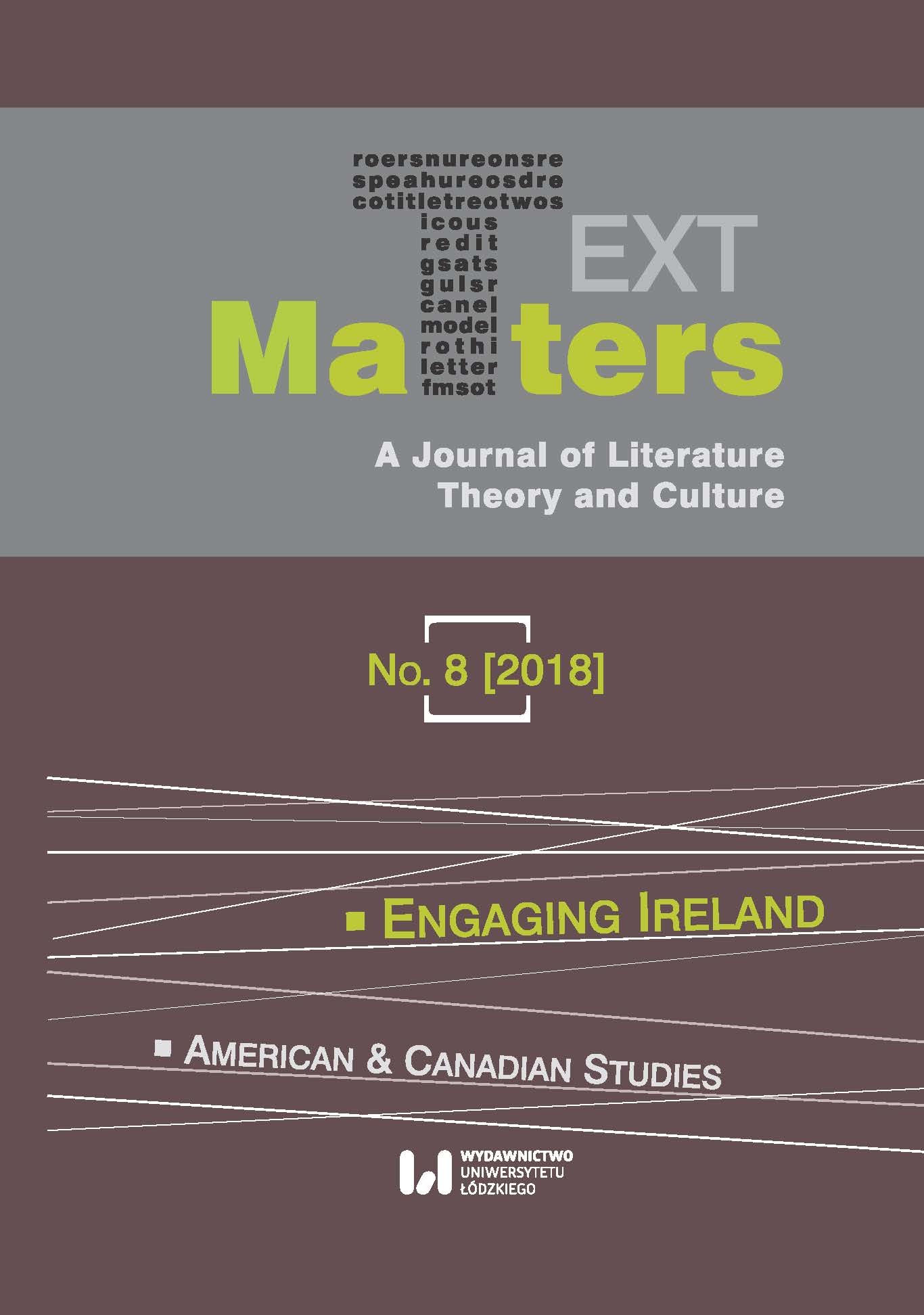Recessive Action in Colm Tóibín’s "Brooklyn"
DOI:
https://doi.org/10.1515/texmat-2018-0003Keywords:
Colm Tóibín, Brooklyn, immigration, detachment, minimal realizationAbstract
Colm Tóibín’s 2009 novel Brooklyn accompanies Eilis Lacey, a native of Enniscorthy, Ireland of the 1950s on a reluctant voyage across the Atlantic. Her passage reconstructs a common experience of immigration and exile to New York for the Irish working class seeking to escape the lack of prospects in small-town Ireland after the Second World War. Caught as she is between two homes—the traditional Irish culture she emerges from and the new capitalist society of America to which she emigrates—Eilis is placed in a polemical relationship to the public sphere, staked on multiple grounds of in-betweenness: she is a woman, Irish, and an exile. Belonging, for her, is posited on a complex understanding of the tensions between national and transnational identities. Eilis’s parochialism, at first, and cosmopolitanism, later on, are both decisive characteristics that become driving forces behind her social integration and marriage prospects. She is initially barred from promising job and marriage opportunities due to her naivety and lack of sophistication. As an Irish female immigrant, Eilis becomes in the course of the novel a cosmopolitan from the margins, one of the newly uprooted, and ultimately a split self.
Downloads
References
Cullingford, Elizabeth. “American Dreams: Emigration or Exile in Contemporary Irish Fiction?” Éire-Ireland 49.3 (2014): 60–94. Print.
Google Scholar
François, Anne-Lise. Open Secrets: The Literature of Uncounted Experience. Stanford, CA: Stanford UP, 2007. Print.
Google Scholar
Hagan, Edward A. “Colm Tóibín’s ‘As Though’ Reality in Mothers and Sons, Brooklyn, and The Empty Family.” New Hibernia Review 16.1 (Spring 2012): 31–47. Print.
Google Scholar
Kovács, Ágnes Zsófia. “The Jamesian Secret: Representations of Irish Immigrant Experience in Colm Tóibín’s Brooklyn.” Americana: E-Journal of American Studies in Hungary 12.2 (Fall 2016): n.pag. Web. 15 Jan. 2018.
Google Scholar
Riding, Alan. “The Arts Find Fertile Ground in a Flourishing Ireland.” Nytimes.com. The New York Times 21 Dec. 1997. Web. 15 Jan. 2018.
Google Scholar
Stoddard, E. W. “Home and Belonging among Irish Migrants: Transnational versus Placed Identities in The Light of Evening and Brooklyn: A Novel.” Éire-Ireland 47.1 (2012): 147–71. Print.
Google Scholar
Savu, Laura Elena. “The Ties That Bind: A Portrait of the Irish Immigrant as a Young Woman in Colm Toíbín’s Brooklyn.” Papers on Language & Literature 49.3 (Summer 2013): 250–72. Print.
Google Scholar
Tóibín, Colm. Brooklyn: A Novel. New York: Scribner, 2009. Print.
Google Scholar
Tóibín, Colm. Interview by Paul Morton. Bookslut.com. June 2009. Web. 15 Jan. 2018.
Google Scholar
Tóibín, Colm. Interview by Joseph Wiesenfarth. Contemporary Literature 50.1 (Spring 2009): 1–27. Print.
Google Scholar
Wills, Clair. The Best Are Leaving: Immigration and Post-War Irish Culture. Cambridge: Cambridge UP, 2015. Print.
Google Scholar
Young, Tory. “Brooklyn as the ‘untold story’ of ‘Eveline’: Reading Joyce and Tóibín with Ricoeur.” Journal of Modern Literature 37.2 (2014): 123–40. Print.
Google Scholar
Downloads
Published
How to Cite
Issue
Section
License
Copyright (c) 2018 A Journal of Literature, Theory and Culture

This work is licensed under a Creative Commons Attribution-NonCommercial-NoDerivatives 4.0 International License.













